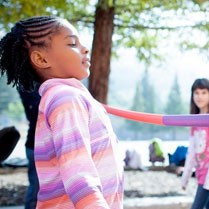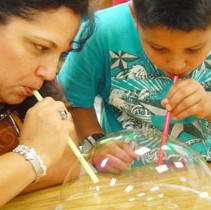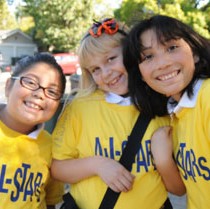
Get Started
Ideal planning period: 6 to 10 weeks ahead of your event
LOGISTICS
- Set a budget. Reach out to potential partners who may be willing to sponsor your event.
- Finalize the time and location of your event.
- Find out if you need any permits for your venue.
- Partner with local organizations or program providers to maximize resources. Set a meeting or conference call schedule. Draw up a list of responsibilities and deadlines.
- Reach out to vendors and staff/volunteers you may need for your event. Think about catering, photography, restrooms, supplies, decorations, and entertainment. Reach out to vendors as early as you can in your planning process.
- Form your event team. Suggested roles include event chair, logistics lead, media and public relations lead, and manager of VIPs and RSVPs.
MEDIA & PROMOTION
- Compile a list of media to invite.
- Draft and distribute a calendar announcement to newspaper calendar sections, as well as local television and radio calendar editors.
- Draft and distribute a short newsletter article promoting the event for the websites and newsletters of allied organizations.
- Advanced outreach: Draft a 60-second public service announcement (PSA) and distribute it to local radio stations. Write it so the PSA can be read by the stations' on-air talent, promoting Lights On Afterschool.
- Advanced outreach: Draft and send a pitch letter to the editorial page editors of major daily newspapers.
INVITATIONS
- Create your invite list of community members, media, and policymakers.
- Invite guest speakers, including policymakers.
- Request a proclamation from your mayor or city council. Once you have the proclamation, be sure to have it framed for presentation at your event. Keep in mind that it can take a couple of weeks for professional framing.
MATERIALS
- Outline your event program.
- If you don't already have materials about your program, develop a program fact sheet.

Next Steps
Ideal planning period: 3 to 5 weeks ahead of your event
LOGISTICS
- Reconfirm with vendors and staff/volunteers what you need for your event.
- Arrange transportation for dignitaries and guest speakers, if necessary.
MEDIA & PROMOTION
- During the month of your event, post signs and posters in public places.
- Draft and distribute a pitch letter to local TV and radio talk show producers, including local cable access. Follow up on your pitch letter with a call.
INVITATIONS
- Continue to update your guest list with more friends, the media, local dignitaries and celebrities as well as business people and other potential sponsors.
- Send out your invitations.
- Call to confirm VIP guests.
- Update the RSVP list daily leading up to the event.

Home Stretch
Ideal planning period: 3 weeks through the day before
LOGISTICS
- Get a weather report if your event is outdoors. Make the call as to whether or not you're going to enact your rain backup plan.
- Plan for a press sign-in table, where you'll give reporters a news release and media kit as they arrive at the event.
MEDIA & PROMOTION
- Distribute a media alert telling reporters about the event.
- Pitch local media on attending the event.
- Fax or email your news release to your media list on the day of the event.
- Assign someone on your team to record any television or radio news broadcasts covering your event.
- Assemble components of a media kit for distribution at the event. The kit should include:
- A fact sheet and/or other promotional materials about your program, including information on how to enroll students
- A fact sheet about Lights On Afterschool and the state of afterschool
- Your news release about the event
- A copy of any proclamations from the governor, mayor, council or school board
- Copies of prepared remarks by your speakers
- A list of upcoming afterschool events
- Letters from parents, volunteers or students describing why they support the program
- Advanced outreach: Submit a column to the major local newspaper or to several community papers.
- Advanced outreach: Draft and send unique letters to the editors of local newspapers promoting the event.
INVITATIONS
- Update your RSVP list daily leading up to the event.
- Reconfirm attendance by policymakers and other key speakers. Share the program agenda with speakers and offer to provide talking points.
- Send out your invitations.
- Call to confirm VIP guests.
MATERIALS
- Update the agenda as you confirm speakers, VIPs, guests, and activities.
- Copy the afterschool petition for attendees to fill out.
- Print out lightbulb art for guests and students to decorate.
- Print out event programs or agendas, informational materials about your program, and fact sheets about your program and afterschool in general for distribution to attendees as they arrive at your event.

Lights On Afterschool
Tips for the day of your event
LOGISTICS
- Be sure to have guests sign in. Feel free to use the afterschool petition.
- Have an event program or agenda available at sign-in, along with informational materials and fact sheets about your program and afterschool in general.
- Set up a separate press sign-in table where you'll give reporters a news release and media kit.
MEDIA & PROMOTION
- Fax or email your news release to your media list on the day of the event.
INVITATIONS
- Greet VIPs as they arrive at the event.

After Your Event
MATERIALS
- Gather your lightbulb art to deliver to congressional district offices. Send the artwork along with a personal note and information on your program, or arrange to hand deliver it. Consider making it a field trip for students.
MEDIA & PROMOTION
- Make copies of any news articles or broadcast stories to send to your board of directors, funders, parents, volunteers and policymakers at all levels. Keep videos to show at fundraisers, orientations or meetings you have in the future.
- Stay in contact with reporters who attended your event or produced stories. Contact them in May or June to see if they'd be interested in doing an end-of-school-year follow-up on your afterschool program. Or have the students in your program create a thank-you card.




